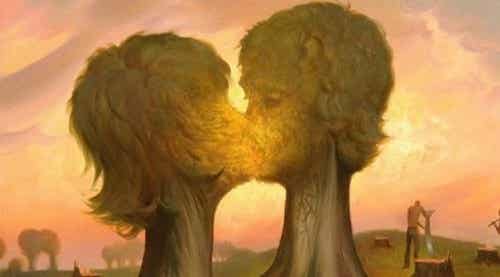
Written and verified by the psychologist GetPersonalGrowth.
Last update: 15 November 2022
According to anthropologist Helen Fisher, people are born to love. More or less correctly, this intense and complex feeling is also the source of our existence. Our creativity and many worries depend on love. Know theevolution of love within the couple it will also allow us to deepen our very essence.
If we said right now that "love is everything", many might be skeptical. Culturally we are cynical of this idea. From a biological and anthropological point of view, this sensation, this vital and revolutionary impulse has allowed us to establish ourselves as a species. Because love does not only facilitate the consolidation of a couple and the birth of children.
Affection makes room for cooperation. It makes us feel the object of another person's attention and care. Love gives us the space we need to reduce anxiety and stress. It extinguishes fears. Awaken our creative side. Understanding and deepening the evolution of love within the couple allows us to see how benefits, functions and meanings are hidden in every phase of our relationship.
“Passion is the fastest to develop and the fastest to disappear. Intimacy develops more slowly and engagement even more gradually. "
-Robert Sternberg-
The evolution of love within the couple, a variable but solid material
Gerald Hüther, neurobiologist and professor of neurobiology at the University of Gotinga in Germany, offers us an interesting reformulation on the evolution of the human being. According to the scholar, science has so far highlighted the aspect of natural selection and the principle of survival based on the strongest individual. According to Dr. Hüther, however, It was only this very delicate but incredibly solid glue that allowed us to progress as a species. The love.
This undetectable material under the lens of a microscope does not always last or maintain the same shape or state. Obstacles, disappointments, challenges appear. For Gerald Hüther, as well as for the anthropologist Helen Fisher, nothing is more important than understanding the evolution of love in the couple. If we understood the characteristics of each phase, we would be better prepared the ups and downs that can occur at any time. Let's see some of them.
Infatuation
The first phase, the most pleasant one. Falling in love, this prelude full of mysteries, fantasies and new discoveries. An explosive cocktail of dopamine, serotonin, oxytocin and noradrenaline. Everything is particularly intense in this phase. Emotions are uncontrolled and nothing and for our brain nothing is more significant than the desired person.
Just as the famous psychologist John Gottman reminds us in his book Principa Amoris: The New Science of Love, this initial phase of falling in love defines so-called infatuation. By infatuation, we mean a state of absolute grace in which an individual is overwhelmed with euphoria and hope.
Romantic love or bond
After this love at first sight that threw us out of bed with a wave of hormones full of passion and attraction, we reach another stage. The evolution of love in the couple reaches a new stage: doubts. Does the relationship mean the same for both of you? Will she stay with me at all times? Can I rely on this person?
- These questions take us into this new phase: romantic love. The passion remains, but with it the fears and worries arise. Most of all, however, we are overwhelmed by the desire to be linked to the loved one. It is one of the most beautiful phases in a relationship. Authentic journeys are undertaken in which the obsession with infatuation gives way to a sense of authentic trust.
- It is more common for other problems to arise during the romantic love phase. We want to make our bond stronger and for that we are obliged to get to know each other better, to negotiate and to resolve disagreements. We have to be that couple of dancers in which both have to control their steps without dragging the other, in which empathy, reciprocity, care and tolerance must shine. If we perform these steps effectively and intelligently, we will generate maturity for the steps that follow.
Mature love, the snare of loyalty
We do not have a precise estimate of the duration of romantic love. There are those who establish an average of 4 or 5 years. Nonetheless, Helen Fisher indicates that between 30 and 40% of older couples report that they are still in this phase. People interviewed said that romance doesn't fade away. Indeed, it persists and guarantees a very satisfying bond.
On the other hand, John Gottman stresses the importance of working on nurturing a mature love. It is about the ability to build a solid commitment, to see the best teammate in the other. We must value the partner by behaving with tenderness and affection. In this way our relationship will be a caring and understanding emotional bond that enriches both of us equally.
The evolution of love within the couple does not depend on time. The way in which the various stages of love enter our life is not automatic. Love and its changes are not regulated. Achieving stability and this loyal happiness, which compromises and enriches, requires some work. Intuitive and careful craftsmanship that knows which corners to file and where to mount the hinges is essential. The gaze understands, the hearing listens and the heart understands, yields and welcomes.
It is a complex journey, no doubt, but love is an adventure for which the joy is worth it, not worth it.
Images courtesy of Vladimir Kush


























